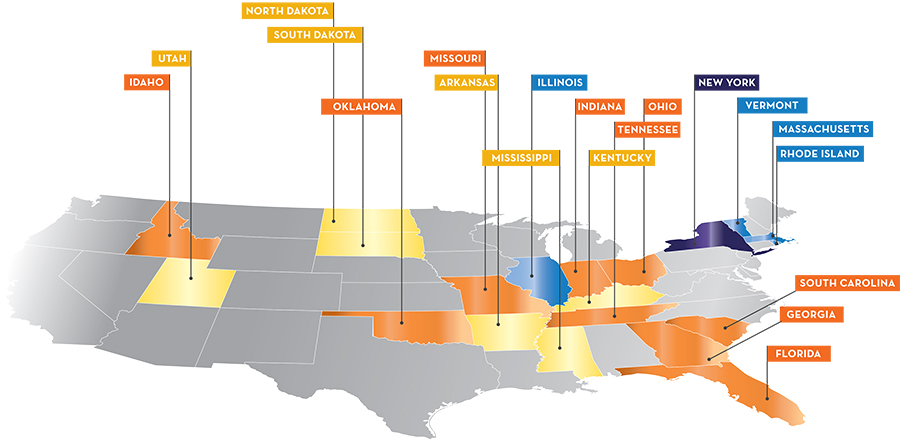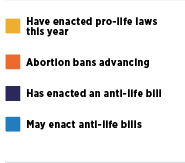The Bible tells us that God saw our “unformed body” (Psalm 139:16) while we were still in our mother’s womb. As Christians, we believe that life begins at conception. Yet in today’s culture, the right to life has become a political battleground, with liberal progressives demanding the “right” to murder the unborn.
United States Supreme Court Justice Anthony Kennedy’s retirement launched a new era for state and federal efforts to either expand or restrict protections for unborn children and their mothers. By the time his replacement, Justice Brett Kavanaugh, was confirmed, advocates on both sides of the abortion debate were predicting what a “post-Roe” United States would look like, and debating how to prepare for it.
Nearly six months after the purported shift in ideology on the high court, however, the justices appear reluctant to review challenges to abortion regulations, and only a few states have enacted new abortion-related laws. Nevertheless, a survey of state legislation and pending court challenges reveals an aggressive shift in strategy for both pro-abortion and pro-life advocates and legislators.
Pro-Abortion Strategy—On the Offensive
In the decades since Roe v. Wade, abortion advocates have challenged virtually any law that arguably violates court-created protections for abortion access. While they continue this practice, they have also unveiled new strategies to respond to the perceived threat that Roe’s reversal is imminent and the undeniable reality that there has been a marked decrease in abortion providers nationwide.
First, they are filing lawsuits that challenge multiple pro-life laws in one fell swoop by arguing that the laws’ “cumulative effect” creates an undue burden on abortion access in a state. In other words, they contend that the collective impact of numerous incremental and constitutional pro-life laws, such as clinic regulations, bans on abortion by telemedicine, parental involvement requirements and informed consent provisions, results in an environment where women have constitutionally insufficient access to abortions. These lawsuits are pending in at least five states—Indiana, Louisiana, Mississippi, Texas and Virginia.


Second, they are challenging state laws, many of which have been in effect for decades, that permit only physicians to perform abortions and mandate active physician care for abortion patients. This strategy, closely tied to the promotion of abortion-inducing drugs, is a reaction to the decrease in physicians willing to perform abortions.
Finally, they have adopted a legislative strategy in blue states by introducing bills to repeal pro-life laws and enshrine abortion rights in state codes. New York enacted a law codifying the right to abortion through nine months of pregnancy and repealing the state’s meager protections for unborn children.
While abortion advocates hoped their quick success in the Empire State was a sign of more victories to come, abortion advocates in New Mexico suffered an embarrassing defeat when the Democratic state Senate failed to repeal New Mexico’s limited pro-life laws. However, legislation similar to the New York law may still pass in Illinois, Massachusetts, Rhode Island and Vermont.
Pro-Life Strategy—Goodbye, Incrementalism
Without a Supreme Court willing to recognize state authority to ban or even effectively regulate abortion, pro-life legislative strategy has focused on obtaining incremental legislative wins. While some of the measures enacted in recent years were drafted to test the boundaries of court precedent, they were primarily part of a prudential strategy to save some lives now and educate the public while chipping away at Roe.
No more. Unborn-friendly states are aggressively pursuing gestational limits and procedural abortion bans, rather than legislation drafted to stay within current court boundaries.
In states with pro-life legislatures and governors, legislation is advancing that supporters and sponsors know will be promptly challenged and enjoined. Advocates hope that with enough pressure, the Supreme Court will feel compelled to review one or more of these laws, leading to the demise of Roe and its progeny and recognition by the court that states have authority to limit abortion.
The governors of Kentucky and Mississippi recently signed bans on abortion once a fetal heartbeat has been detected, around six weeks’ gestation. A court has already temporarily enjoined the Kentucky law, and the Mississippi law will likely face an injunction as well. Nevertheless, “heartbeat bans” have been introduced in at least a dozen additional states this year, and at least half of those states are unlikely to be deterred by these injunctions.
Arkansas and Utah enacted 18-week abortion bans, and multiple states are considering gestational bans of various lengths, ranging from eight to 21 weeks. Arkansas’ governor also signed a “trigger” statute, an abortion ban that will become enforceable if Roe v. Wade is reversed in whole or in part. At least six additional states are considering trigger statutes.
Kentucky’s governor signed a bill prohibiting abortions based on sex, race or disability, which, like the state’s heartbeat ban, is temporarily enjoined. About 10 other states are considering bans on discriminatory abortions as well. Utah’s governor signed a bill prohibiting abortion based on a diagnosis of Down syndrome that will go into effect if a similar law is upheld in another state.
In Iowa and Oklahoma, where state legislatures and governors are pro-life but courts are not, state constitutional amendments are moving to clarify that the state constitutions do not guarantee a right to abortion. Kansas will follow suit if, as many fear, its state Supreme Court finds a right to abortion in the state constitution when deciding a pending case.
More Aggressive and More Polarized
States have always been the true battlegrounds in abortion policy conflicts. While Supreme Court decisions have crippled state authority to protect unborn children and their mothers, many states have persevered in enacting meaningful laws that protect life. In other states, pro-abortion legislatures have enacted laws enshrining abortion in their state codes, or activist state Supreme Courts have “found” a right to abortion in state constitutions.
As advocates on both sides await the U.S. Supreme Court’s expected return of more authority to regulate abortion to the states, the contrast between legislative activity in pro-life states and states controlled by pro-abortion lawmakers will become increasingly stark. ©2019 Mary E. Harned
Mary E. Harned is an associate scholar with the Charlotte Lozier Institute, the research and education institute of the Susan B. Anthony List.
